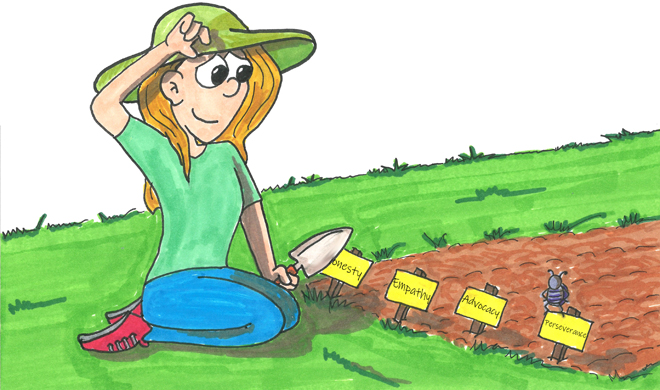January 11, 2022

Many years ago, I was sitting with my principal, Traci Heuhs, in an end of the year wrap-up meeting. As the conversation was winding down, she told me that I was a natural leader and asked how she could support me in expanding myself in the field of education. The comment took me aback and made my stomach churn. Leadership was something that felt uncomfortable to me. I most certainly did not have the confidence to be a leader, especially with my peers.
As I do with comments like this, I thought about it for a long time.
What makes a good leader?
What did my principal see in me that I didn’t see in myself?
What was my responsibility to my students in truly understanding the complexity and necessity of leadership?
Why was developing my own leadership style critical to all aspects of my life?
I realized that the only way I was going to be able to explore the idea of leadership was by leaning into that discomfort and pushing myself into new and challenging experiences.
Maybe that’s the point.
Leadership correlates to power. Being a leader means you have influence. I believe that is true, but it isn’t power for yourself. It’s the power of your own character, and how you hone your own traits to lead change.
Being a leader is complex and difficult because you are developing a trajectory for both yourself and those around you. It is an important and critical role and needs to be viewed as such. It seems to me that if the weight of leadership isn’t always resting on your shoulders, holding you accountable, then you aren’t doing it right.
Leadership is about finding your voice and modeling how to listen, respond and advocate. It is about seeing the potential in others and guiding them to shine. Leadership is about speaking out on injustices and searching for solutions instead of wasting energy on complaints.
It has taken me my whole life to establish my voice. Understanding how difficult that journey has been for myself has really made me think about an educator’s role in the development of character and leadership within their classroom walls.
As an elementary teacher, understanding the importance of how to develop leadership in the youngest of learners is essential. It seems this is an area that is not heavily emphasized at the early grades, in large part because its focus and importance is usually attributed to older students. I would argue that sentiments like this one are part of the reason that we see so many students lost and uncertain of themselves later in their school careers, which is projected through their success and engagement in school.
Over the last 18 months, I have been a part of a conversation in my district around leadership, character and soft skills that are essential to the success of students at the secondary level. Sitting in these meetings, I have realized that helping students develop voice, leadership and advocacy of themselves can’t begin at the later grades. It needs to be an intentional progression over time that must be prioritized and attended to by the adults in that child’s life. Ultimately, it is about providing opportunities for students to build confidence and understanding of themselves by using their own strengths and personalities.
I know that many schools have character and leadership curriculum. For many students, these structures are enough to hone and develop these essential life skills. Like all learning though, many students need more personalized attention to recognize and understand their authentic selves. Understanding students deeply is critical, as the words, mannerisms and actions teachers use contribute to a student’s perception of themselves. Helping students explore and understand their voice is the key to helping students find and define leadership for themselves. Ultimately, it is the guidance and development of honesty, empathy, advocacy, perseverance and problem-solving skills. All these elements are critical in establishing a student’s voice, and what leadership looks like to them.
What I realize now from that meeting many years ago is that my principal awakened a part of myself that I did not yet see. As teachers, we have that same opportunity every day with our students. Let’s plant the seeds of possibility. I can guarantee that being cognizant of your students’ strengths, especially those they do not yet see or understand, could change their perception and trajectory of themselves forever.
 About Leah Porter: I am a third-grade teacher at Wilcox Elementary in Holt Public Schools. As an educator for over 15 years, I strive each day to help students develop into their most authentic selves. I value providing instruction that helps create leaders and competent, critical thinkers who will be strong voices and caring citizens in their community. As Michigan Teacher of the Year 2021-2022, I strive for all my work to be seen through the lens of equity and accessibility, and how to build educational systems for learners that will transform the trajectory of education across the state of Michigan and beyond.
About Leah Porter: I am a third-grade teacher at Wilcox Elementary in Holt Public Schools. As an educator for over 15 years, I strive each day to help students develop into their most authentic selves. I value providing instruction that helps create leaders and competent, critical thinkers who will be strong voices and caring citizens in their community. As Michigan Teacher of the Year 2021-2022, I strive for all my work to be seen through the lens of equity and accessibility, and how to build educational systems for learners that will transform the trajectory of education across the state of Michigan and beyond.